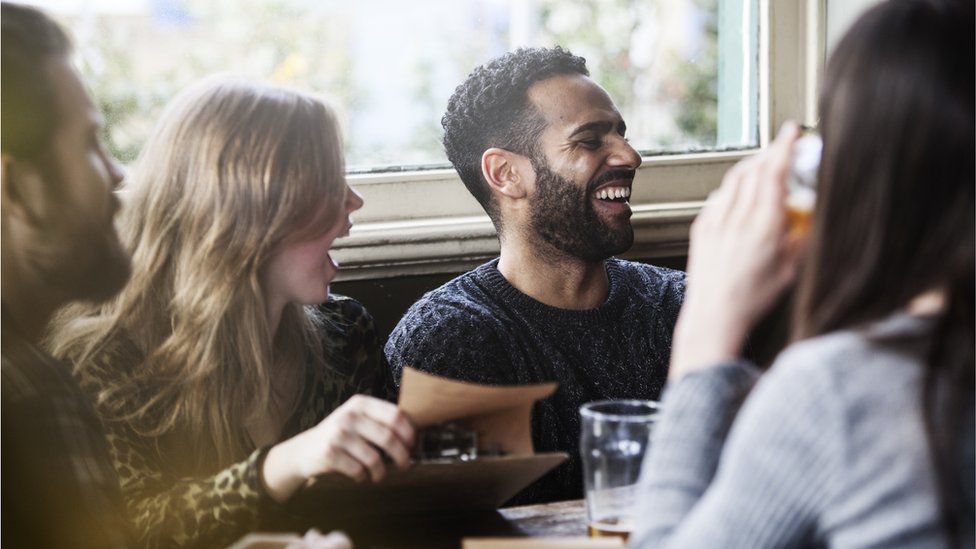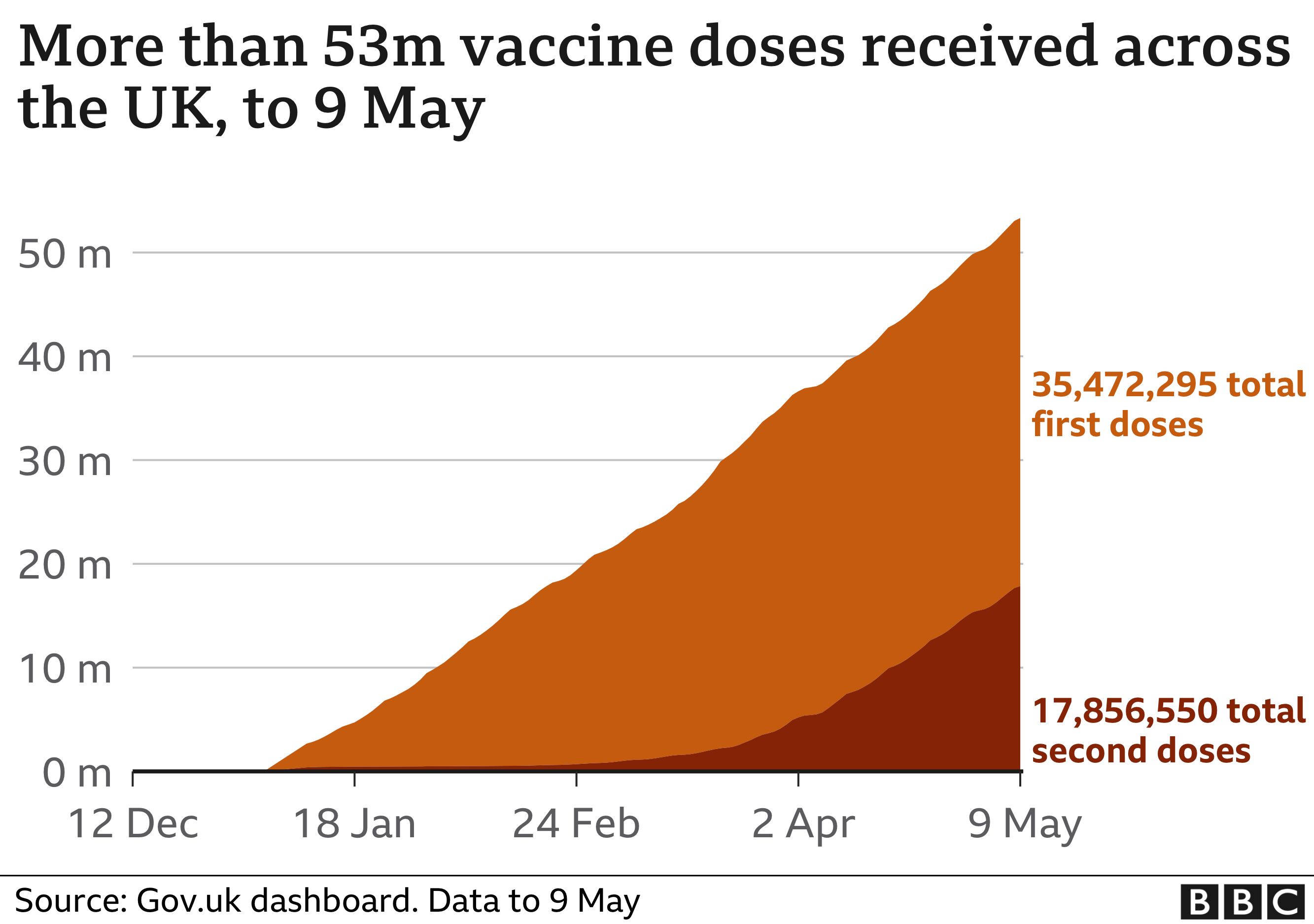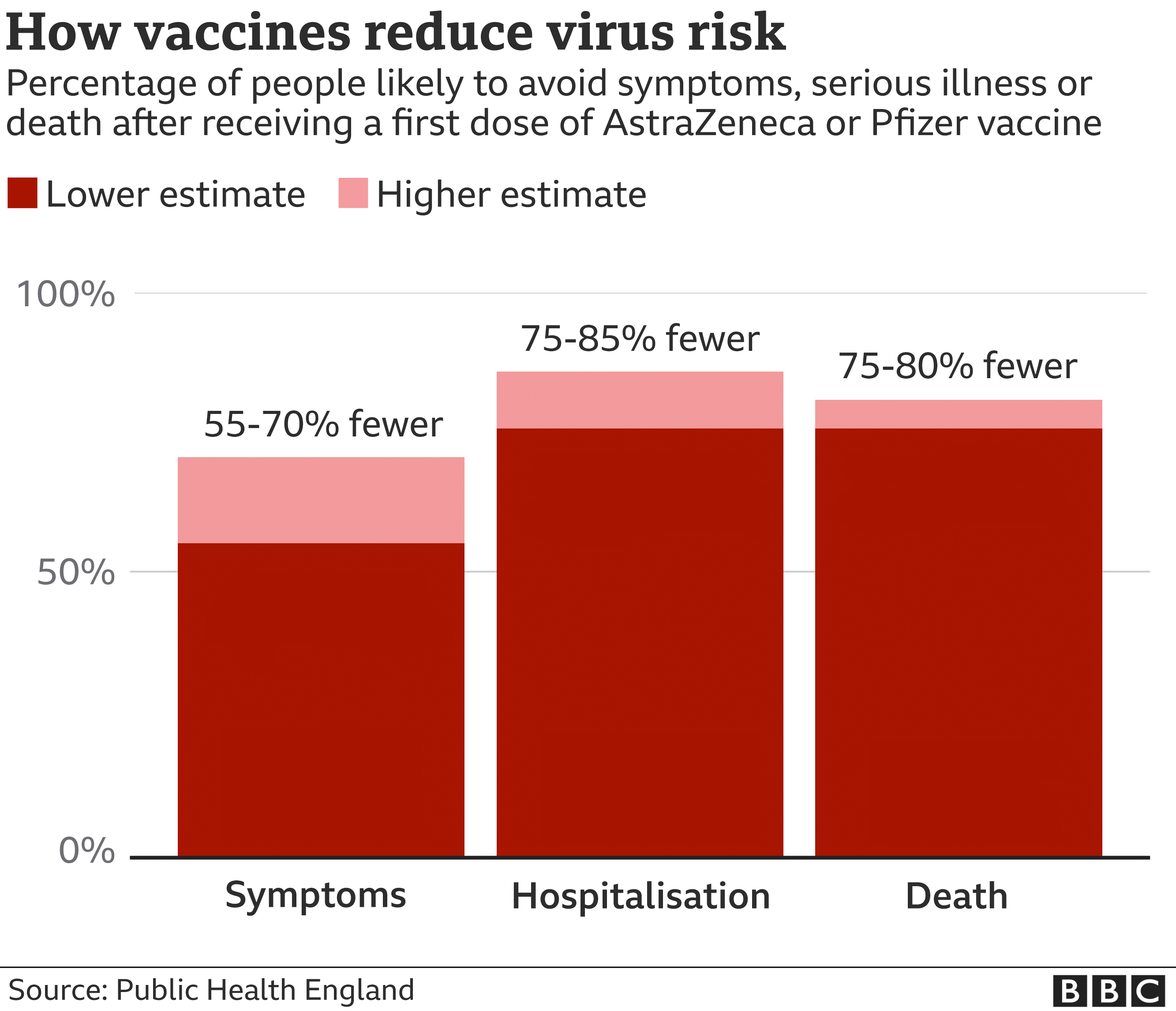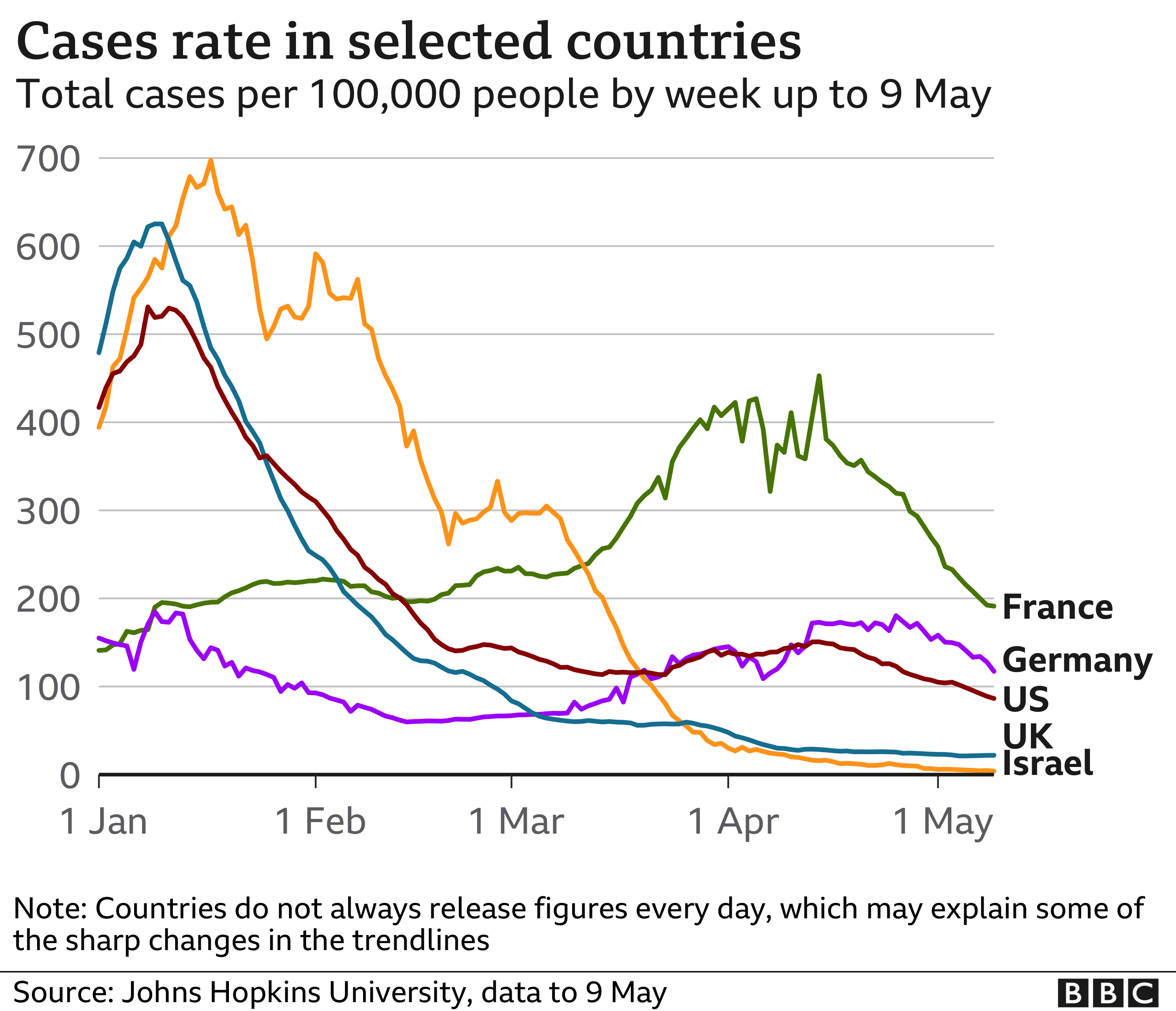Covid: Will UK vaccine success keep virus at bay?
Posted on May 12th, 2021
Nick Triggle Health correspondent Courtesy BBC

Next week will see the most significant lifting of restrictions yet in England, with indoor mixing to be allowed. The rest of the UK is making similar steps.
It means the onus is increasingly shifting on to the vaccines, rather than social distancing and restrictions, to keep the virus at bay. How well do they work? And is there now enough immunity in the population to protect us all?
The vaccines are working wonderfully

The UK has benefited from both fast rollout and good uptake. Currently, a third of the adult population is fully vaccinated, with another third having had one dose.
Among those at most risk – the over-50s and younger adults with health conditions, where 99% of Covid deaths have occurred – uptake for the first dose has been 95%.
Some describe that as being only partially vaccinated. But that can underplay the significance of that first dose, which provides most of the protection – the second acts to boost immunity and is important for long-lasting protection.
The latest government data – based on evidence from the rollout – suggests one dose of the Pfizer-BioNTech or Oxford-AstraZeneca vaccine cuts the risk of infection by as much as 70% and death by even more.

Data on their effectiveness after two doses is only just emerging – but, as expected, it suggests this level of protection is boosted even further. For Pfizer, which was rolled out first, the risk of death is reduced by 97%.
What is more, those that are vaccinated but do become infected are thought to be about half as likely to pass the virus on.
The vaccines are working about as well as could be hoped in the real world – and confirm what the trial results always suggested.
Could we reach herd immunity?
In fact, the impact is so good it raises the prospect of the UK reaching the herd-immunity threshold, meaning the virus is unlikely to spread because so few people can catch it.
Sir John Bell, a member of the government’s vaccine taskforce, believes we may indeed be at a “tipping point”.
But it is a complex equation influenced by other factors. The amount of natural immunity from people who have had Covid already will play a role.
Data from April published by the Office for National Statistics indicated nearly seven out of every 10 adults had Covid antibodies – above what could be explained by vaccination alone.
Another factor is how the public reacts. Even if the government lifts restrictions completely in June, as it has suggested, it is unclear how quickly “normal” behaviour will return.
What is clear is the amount of virus circulating is very low and has continued to fall even as the first steps out of lockdown have been made.

Whether this will be enough to stop infections rising in the coming months remains to be seen.
Scientists had always warned the easing in England, Scotland and Wales on Monday, 17 May, was the one that could push numbers up the most, given the virus is most likely to be passed on indoors.
But there is good reason to hope the vaccines will be enough to stop that pretty much on their own, says Dr Adam Kucharski, an expert in infectious diseases, at the London School of Hygiene and Tropical Medicine.
“It is possible we will get to a situation where [infection rates won’t rise] without the need for many other measures,” he says.
“The vaccines are working that well that domestically we can gradually relax restrictions and enjoy the summer.”
Variants cause some uncertainty
The big unknown, Dr Kucharski says, is the variants. Those identified in Brazil, South Africa and India appear to be able to evade some of the immune response from the vaccines.
But much of this is based on testing in labs rather than evidence from the real world, which makes it hard to interpret, as it largely focuses on one element of the immune response – antibodies.
“The data is very patchy. That makes it difficult knowing with certainty what will happen next.”
The “most likely scenario”, he says, is vaccines lose some ability to stop infections – but provide protection against serious disease.
St AndrewsWe are in a really good position… We are de-risking CovidDr Muge Cevik
University of St Andrews
Emerging real-world evidence suggests this is the case. A study in Qatar indicated the Pfizer-BioNTech vaccine remained as effective at preventing serious illness and lost only a little of its ability to block infections – and that was against the South Africa variant scientists are most concerned about.
But the lack of certainty makes some uneasy. University College London clinical research director Prof Christina Pagel, a member of the Independent Scientific Advisory Group for Emergencies, wants the UK to proceed with more caution, not releasing restrictions fully until all adults have received their second dose, which is not expected before the end of September.
She is calling for an Australia-style closure of borders to reduce the risk of variants being imported. “I just don’t think it is worth the risk,” she says.
Worst case – low-level spread
But, as always with Covid, the argument returns to what is proportionate. There is a theoretical risk the virus could mutate enough to undermine the vaccines so there is a surge in serious cases.
But what is the likelihood of that happening all of a sudden as opposed to a gradual shift over years that is more common with coronaviruses and will allow vaccines to be updated to keep up with the virus?
Prof Neil Ferguson, an expert in infectious disease, from Imperial College London, whose modelling led to the first lockdown, says it is the worst-case scenario and unlikely. And the UK is “much more likely to be on a steady course” out of the pandemic.
Dr Muge Cevik, from St Andrews University, agrees. Having researched the variants, she says we should take confidence from the emerging picture, with the evidence “strongly pointing” to the vaccines continuing to work really well, at least in terms of preventing serious illness and death.
At worst, there will be some continued low-level spread – but the vaccine programme’s success means that is now less likely to translate into significant numbers of serious cases.
“We are in a really good position,” Dr Cevik says. “We are de-risking Covid.”
May 12th, 2021 at 4:32 pm
Thank you for this article.
May 12th, 2021 at 7:32 pm
“There is a theoretical risk the virus could mutate enough to undermine the vaccines so there is a surge in serious cases”
Is it only the viruses that can change (mutate) in order to survive?. But the thing is that those living in disadvantaged regions like the west has to resort to vaccines for a quick fix, thereby making it impossible for the body to develop it naturally.
Yes, Brits always seem to do the right thing: take the use of minorities to protect their UK unity; the use of ‘Dua Lipa’ drama.
She obviously is a woman of Malay origin helping her country.
The irony is, it is quite the opposite in our own country. Our own parayas are using the minorities to reduce the numbers of majority by poisoning them in various ways thereby dreaming of their support to stay in power for ever?.
May 12th, 2021 at 7:59 pm
My question to the wise men of our country, the so called ‘Jathiye Mura Devathawos’, why cant they see this coming, instead of receiving the atapirikara from even the devil and give the seal of approval in public?.
May 13th, 2021 at 11:09 pm
I would like to put this also on BBC’s account because I picked up what I write now also from BBC this morning. According to their report the market value of Bitcoin shares have fallen sharply as a result of a negative comment by Elon Musk, the rocket man.
When Elon addressed some oil sheiks in Dubai about a year ago he talked about something about a Canadian company that is doing research on AI. It seemed to me that he did not have a clear understanding about what he was talking, but was doing a publicity stunt. I made a comment expressing my opinion about what he was doing: make statements in public so that his company’s share value increase. And he can then do whatever he wants with increased share value. It was in Daily FT in SL that I did it. Three months later I accidentally saw more than 30 replies mainly from US agreeing with me.
He has done it again, at Bitcoin’s expense. However the reason he gave may appear true but without correctly understanding the whole thing. He says one third of world’s energy consumption today goes to vast network of computers working on AI algorithms trying to predict Bitcoin’s movements and as a result the coal consumption increases thereby creating an unhealthy atmosphere in the world giving rise to Corona etc. He attributes this situation to the increase of Entropy (disorder) according to the second law of thermodynamics. How incorrect is he?. Entropy (heating effects due to the use of Electro Magnetic Forces) is not the only thing that controls the world and the universe. It has been found that others such as gravitational forces counter those arising from EMF and keep the things in a balanced state with respect to entropy.
So, publicity stunts are a way of increasing wealth!.